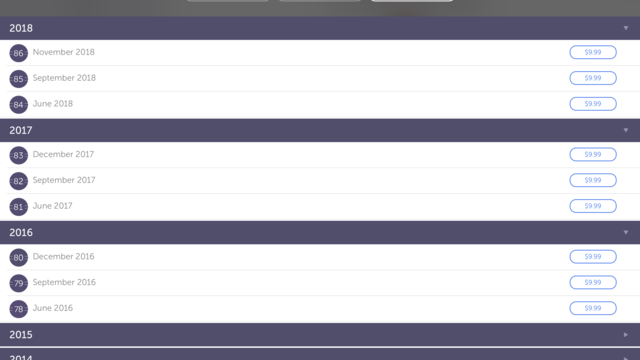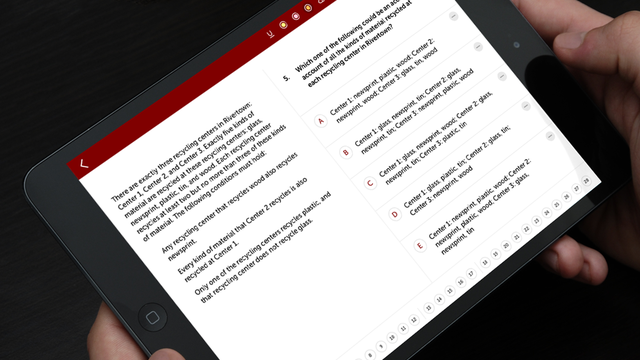If you're taking the LSAT in July or September, you need to put in some serious study sessions over the summer. While you may not be able to spend as much time at the beach, you can still enjoy your summer while sticking to a good study plan. In the following sections, we will discuss a few of our best tips for scoring well on the LSAT, the importance of mimicking testing conditions during your study time, and how to tackle the "practice & review" portion of your LSAT calendar.
But before we dive into LSAT best practices, let's discuss exactly what to expect on the LSAT, as well as how and when to schedule your LSAT preparations.
What Is on the LSAT?
There are 5 multiple-choice sections on the LSAT. However, only 4 of these sections are graded; the 5th is an experimental section that helps the Law School Admission Council (LSAC) test out questions for future tests. You will not know which section is ungraded, so needless to say, you must put your full effort into all 5 sections.
These sections are subdivided into three categories: Reading Comprehension, Analytical Reasoning, and Logical Reasoning. There will always be at least one Reading Comprehension section, one Analytical Reasoning section, and two Logical Reasoning sections. The fifth experimental section can be any one of these categories.
For example, you know that there is traditionally only one section for Reading Comprehension and one for Analytical Reasoning, so if you are taking the LSAT and find that there are two of either, you will know that one of them is the ungraded section. Similarly, if you find that there are three Logical Reasoning sections rather than two, you know that one of them must be un-scored. That said, you still have no way of knowing exactly which section is ungraded, so you must put your best efforts into every section.
Additionally, you will also be required to produce a writing sample based on a given prompt. While this writing sample will not be graded and is separate from the main test, it will be sent to law schools when you apply.
Reading Comprehension
Many people simply do not realize how much lawyers need to read. Texts related to law are often dense, complex, and extremely long. As a result, the reading comprehension section is extremely important in determining a potential lawyer's abilities. It allows law schools to see an applicant's ability to extract meaning from a given text, and also make insightful inferences.
There are four subsections within the Reading Comprehension section of the LSAT. Each subsection contains a lengthy text that will be similar to texts that one must read in law school or law practice. Following each text, you must answer between 5-8 multiple choice questions that test your ability to understand and logically interpret what you have read. In one of the four subsections, you will receive two shorter passages. This subsection is known as Comparative Reading and will require you to analyze both texts in relation to one another.
Regarding the content of these texts, it can be drawn from a wide range of topics and areas of study. For example, one reading might be related to the humanities, while another could be directly related to law. In any case, it is best to be well-versed in as many broader subjects as possible (history, biological sciences, etc).
That said, the Reading Comprehension section is not meant to test your preexisting knowledge of a given subject matter. You will need to hone your reading skills and be able to draw meaning from complex wording and text structures.
Analytical Reasoning
The Analytical Reasoning section is meant to test your ability to draw logical conclusions from a set of facts or propositions. Much like the Reading Comprehension section, Analytical Reasoning is broken down into subsections, with each subsection focused on a single passage, followed by questions related to the text.
Each passage is generally unrelated to law. These readings introduce scenarios that require critical thinking skills. For example, one reading may introduce you to a situation in which two employees at a company have conflicting interests, and may need to decide how best to proceed given certain company policies. Most of these questions will test your ability to find out either what must be true or what could be true, given certain parameters. This section is especially important for potential law students, as it tests your ability to look at a set of rules and use your deductive reasoning skills to reach a reasonable conclusion.
Logical Reasoning
Both of the Logical Reasoning sections test an applicant's ability to identify, evaluate, construct, and refute arguments. First, you will be given brief examples of arguments, and then you must critically evaluate the validity of each. These samples are drawn from many different sources, often unrelated to law, including magazines, newspapers, and scholarly texts.
You will be expected to answer one or two questions for each sample argument. These questions might ask you to identify different parts of the argument, recognize patterns of reasoning, detect assumptions, or identify flaws in the argument. This will require you to really understand how arguments are constructed and how logic can (and cannot) be used to reach a given conclusion.
However, you are not required to have specialized knowledge of argumentation or related vocabulary. You will simply need to recognize different elements of arguments (premise, conclusion, etc.) and identify how they relate to one another.
Now that you know what to expect, let's look at how and when you should start preparing for the LSAT.
When Should I Start Preparing for the LSAT?
The LSAT is designed to evaluate how well you will do in law school and, eventually, on the bar exam. It tests the skills that are necessary to study and practice law. Some people develop these skills naturally (to one degree or another), while others need to study concepts like logical and analytical reasoning extensively. However, everyone will need to put a great deal of time and effort into LSAT preparation, no matter how confident you are in your reasoning skills.
It is recommended that you spend anywhere between 4-8 hours studying for the LSAT per week, for no less than 3-4 months prior to the exam. Obviously, starting earlier will help you be as ready as possible. So, 3-4 months in advance is the minimum amount of time you should give yourself.
However, when it comes to the weekly or monthly allotted study time, you will need to evaluate your specific needs and schedule to find a rhythm that works for you. It is also important to develop efficient study skills. Some people can pour over books and notes for hours without absorbing much information, so you should try to build good study habits and keep track of your progress as go along.
Most importantly, don't over-exert yourself. Many people think that they simply need to study as much as possible to pass the LSAT. However, this can be counter-productive. LSAT preparation can leave people feeling exhausted, or getting to a point of mental burnout. This is not a situation you want to be in, as it can negatively affect your LSAT score.
So, while you should not take the LSAT lightly, you should also not put yourself on a path to burnout. This is why 4-8 hours per week for a period of at least 3-4 months is recommended. This way, you have ample time to study and hone your reasoning skills, without the need to cram in information at the last minute.
Best Tips for LSAT Success
Hopefully, the information above has shed some light on how the LSAT is administered and gives you a solid foundation for preparing your study sessions. Next, let's take a look at a few of our top recommendations for scoring well on the LSAT.
Learn About the LSAT
Before launching into your studies, it's important to familiarize yourself with the LSAT's format. As stated previously, the test has five 35-minute sections of multiple-choice questions broken down into the following sections: Logical Reasoning (two sections), Analytical Reasoning, and Reading Comprehension.
One of these sections contains experimental questions that will not be scored. However, you won't know which of these sections is the experimental one until you get your score. There's also a 30-minute essay section that, while un-scored, will be sent to all the law schools where you apply. The test takes a total of 3.5 hours, and scores range from 120 to 180.
Obviously, a higher score is always better. That said, it is extremely rare for someone to achieve a perfect score of 180, so you should aim high, but also temper your expectations. The average score is 150, but if you hope to get into one of the top law schools in the country, you will almost certainly need to score higher than 160.
Take a Baseline LSAT Practice Test
When you first start preparing for the LSAT, you will want to know which areas you need to improve on, as well as the areas in which you excel. Taking a practice test at the beginning of the summer is a great way to see where you stand. Look at your scores by section and identify which areas you need to work on the most.
Once you've completed your first practice test, compare your score to average admission scores at the law schools you would like to attend. How do you measure up? How much do you need to raise your scores to secure admission to your safety schools? What about your reach schools? We offer a free LSAT practice test to help you start your LSAT prep right!
Make a REALISTIC Study Schedule
Using the results of your baseline test, make a schedule that prioritizes the areas you need to work on the most. First, break down what you're studying by day; for example, maybe you plan to practice reading legal texts on Monday, and you plan to deconstruct sample arguments on Tuesday, and so on. It is important to set specific times and days for each task or area that you want to cover.
However, it is even more important that your schedule is realistic. Build your study schedule around your childcare duties, your job, and any other commitments that you have throughout your week. It's better to have two productive study sessions per week than to try to cram in 30 minutes on your lunch break or during your daughter's playdate when kids are screaming in the background. Identify which times of day work best for you, as well as your ideal study conditions, and you'll have a much easier time building a workable study schedule.
If you're known to ignore your alarms in the morning, don't set yourself up for failure by scheduling your start time for 7 a.m. Additionally, if you get distracted easily, avoid lively coffee shops or crowded study halls. Ideally, you should study in your home or a quiet area of the library. However, if you do plan to study at home, try to avoid the urge to study in bed. This often leads to distractions; maybe you want to listen to music and it causes your mind to wander, or it might even cause you to take unintended naps.
In any case, you will need to take inventory of your life, your study requirements, and your LSAT strengths and weaknesses to create a realistic study schedule that will set you up to succeed.
Take More Practice Tests
We've already discussed taking a preliminary test to gauge your own strengths and weaknesses, but you also need to take additional practice tests periodically. You will need to build these practice tests into your study schedule and, when you're ready, begin an LSAT prep course. Use these tests to chart your progress and to modify your study schedule based on what you're getting better at and what needs more of your attention.
Practice tests are also a great way to calm your nerves when it's time to take the actual test. Obviously, the LSAT is a very important exam, and you will probably be pretty nervous about the results. However, if you've already accustomed yourself to taking the test, you will feel much more relaxed when it's time to take the real one.
Prioritize Your Health
Part of setting yourself up for success on the LSAT is taking care of your health. Studying every second of the day may feel like the right thing to do, but nobody can focus all day long. Exercising regularly, eating well, and logging enough hours of sleep will get you in the right frame of mind to study most effectively and, ultimately, raise your score. After all, if you try to walk into the exam after studying non-stop for months on end, your brain may end up crashing at the worst possible moment.
Join LSAT Study Groups
For some people, studying is a solitary affair; sometimes you really do need to be alone with your books. This generally helps increase focus and cut down on unwanted distractions. However, can also really benefit from the insight and company of other students who are in the same boat as you.
Join a study group (aka mastermind) to inject a dose of social stimulation into your study schedule. Consider scheduling a group study session once a week or a few times per month, depending on your needs and schedule. Use a study group to trade strategy tips, ask questions, and compare notes. It's true that there is strength in numbers, and it'll help your mental state to be with other people who are sharing the experience.
Still unsure about getting involved with a study group? Read up on the benefits of LSAT masterminds.
Make Time for Fun
It's summer. The sun's out, the sand is warm, and the ocean is calling your name. It's OK to take a beach day with your friends or go on that camping trip with your family. You can't study every minute of the summer, and you shouldn't. Social events are good for the soul, and a sense of balance will give you a healthy state of mind, which is absolutely necessary to ace the LSAT in the fall. By no means should you neglect your studies; but, if you stick to your study schedule, you should have time to blast "Summertime" and hit the pool for some much-needed rest and relaxation.
While these tips are extremely helpful for establishing a workable schedule without becoming overwhelmed, there are other aspects of your LSAT prep that may still seem unclear. For many students, the "practice & review" portion of their schedule is one of the most tedious, so let's take a look at how to take on this part of your calendar with ease.
How Can I Mimic Testing Conditions?
We've briefly touched upon the importance of becoming accustomed to test-taking, but many people don't realize that taking a practice test is more than just casually answering some sample questions. You also need to understand the importance of mimicking testing conditions. We've discussed this time and time again, but it is a vital topic that is often overlooked.
Your best weapon against the LSAT is practice. And the optimal way to practice is to mirror all the conditions you will face on exam day. This way, come exam time, you will be well-conditioned to focus on the task at hand. Additionally, you will be well-versed in the necessary stamina, speed, and technique required to ace the real test.
Many LSAT students bring up TIMING as a potential issue, especially during the beginning of their LSAT Test journey. A common fear is running out of time without being able to answer all of the questions. However, we would like to stress to you that when you are to the point of simply taking practice tests and reviewing information, timing is not what you should be focusing on. At this point, you want to focus on getting through your lessons and mastering the skills and techniques for each type of question. As you master these skills, your timing will naturally catch up.
Now, that's not to say that timing doesn't take practice. It's imperative to practice your pacing for the exam. Remember, LSAC does not allow digital watches. But don't fret! LSATMax has done away with the dilemma of time calculation during the exam by creating the LSATMax 35-min Analog Watch.
This analog watch only counts 35 minutes. You simply wind the minute hand of the watch to the "12 o'clock" position, which is marked "35," and then begins the section. The minute hand conveniently winds down clockwise and the face of the watch is marked in five-minute increments, from 35 to zero. When the section is done, all you need to do is wind the minute hand 180 degrees, back up to the 35-minute mark, and begin again. You can buy the LSATMax 35-min Analog Watch on our website for only $19 + shipping.
Though timing always seems to surface as a common issue for LSAT students, there is one issue that is far more important: FOCUS. The LSAT is, first and foremost, a test of endurance. You have to sit down and methodically work through five sections, each 35-minutes in length, spanning a total of almost three hours (not including your fifteen-minute break); after which you must finish the un-scored writing section!
Handling "Practice & Review"
Finally, it's time to discuss the importance of practice and review. If you have been following our recommended course calendar, at some point you will have finished the full course and will then turn your attention to "Practice & Review."
But what does "Practice & Review" actually mean? This is the time to practice everything you have learned under time pressure, and work on honing your skills. But do not make the mistake of thinking that the only way to study is doing more and more practice LSAT questions. Reviewing questions that you have already seen is just as valuable, if not more so.
Here is how we recommend approaching the "Practice & Review" portion of your calendar to achieve the highest LSAT score:
Practice and Review Study Guide
- Take one full-length, five-section practice LSAT per week. Ideally, you should do this on Saturdays, at the same time your actual LSAT will be administered. You want your mind to begin associating Saturday mornings with the LSAT.
- After taking this practice LSAT under simulated exam conditions, we would not recommend doing any more LSAT prep that day. Take a break. Hang out with your friends and/or family. Do whatever helps you relax and unwind. It doesn't matter what you do, as long as it helps you destress and it's not related to the LSAT.
- On Sunday, before you score your LSAT, we recommend taking the same LSAT again, but this time without the time pressure. Are you selecting the same answers as the day before? If you're selecting different answers, why? What are you seeing differently this time around, without the time pressure? This will go a long way toward helping you understand your own test-taking skills and which factors (like time constraints, environment, etc.) affect you the most.
- Finally, ask yourself the following question: what makes the correct answer choice correct? What makes the incorrect answer choices incorrect? How do they differ, and how what made you draw one conclusion over another?
This review process will not only allow you to see how the test-makers will try to trick you, but you will also notice how the pressure of time affects your test-taking abilities. Many students have the tendency to break from good habits and strategies when they feel pressured by time.
For example, students love rushing through the Logical Reasoning section, as it feels like each sample requires less time to consider than a long piece of text. This strategy, however, is counterproductive—and you can find out why right here. The key to the Logical Reasoning section is making sure that you understand the argument completely, and rushing through each argument will not do you any favors.
For the rest of the week, to avoid burning yourself out, we recommend taking individual sections under time pressure. This way, you will still be practicing under time pressure, but you will avoid the mental drain of full-length LSATs.
Lastly, make sure you take full advantage of LSATMax's analytics by inputting your answers into the app. These analytics will highlight your strengths and weaknesses, which will allow you to maximize your prep time by focusing on your problem areas. We recommend re-watching our strategy videos for any sections or question types that are still giving you trouble.
We hope this helps! If you have any questions that we have not already answered, please feel free to contact us at any time via email or at 310.935.1704 (Monday-Friday 9am-6pm PST).
Are you interested in learning more about LSAT prep? Do you want to increase your chances of getting into your dream law school? If so, be sure to sign up for our Comprehensive LSAT Prep Course today!










